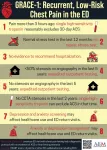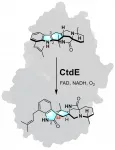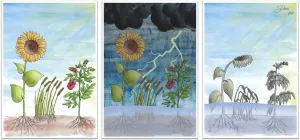(Press-News.org) AMHERST, Mass. - Researchers at the University of Massachusetts Amherst recently discovered that the ability of agricultural grasses to withstand drought is directly related to the health of the microbial community living on their stems, leaves and seeds.
"Microbes do an enormous amount for the grasses that drive the world's agriculture," says Emily Bechtold, a graduate student in UMass Amherst's microbiology department and lead author of the paper recently published in Applied and Environmental Microbiology. "They protect from pathogens, provide the grass with nutrients such as nitrogen, supply hormones to bolster the plant's health and growth, protect from UV radiation and help the grass manage drought." Yet, the increased severity and longevity of climate-change-driven drought conditions across the world is sapping the ability of the microbiome to thrive.
Since 60% of all agriculture is grass-related - think of the cows, sheep and other grass-munching livestock that provide meat, milk, cheese, leather, wool and other staples - the bacteria living on grass touches every aspect of our lives, from what we eat for breakfast to food security, economics and international development.
The new research, which is the first of its kind, focuses on two different types of grasses: those that make up the majority of grasslands in temperate zones and those that predominate in tropical regions. "The goal of this research," says Klaus Nüsslein, professor of microbiology at UMass Amherst, and the paper's senior author, "is to be able to manage the interactions between plants and the bacteria they host in order to support a truly sustainable agriculture." Until now, however, it was largely unknown how grass and its microbiome supported one another, and what effects drought might have on the bacterial communities.
The researchers, whose work was supported by the Lotta M. Crabtree Foundation and the National Science Foundation, grew their temperate and tropical grasses in two different greenhouses. Each greenhouse's climate was controlled to mimic natural climactic conditions. Once the grasses reached maturity, the researchers further divided each group into three sub-groups. The first, the control group, maintained optimum climactic conditions. A second sub-group had its climate altered to mimic mild drought conditions, while the third was subjected to severe drought conditions. Over the course of a month, the researchers counted, gathered, and sequenced the DNA of the bacteria across all the groups of grasses and compared the results.
What they found was that when the bacteria showed signs of drought-induced stress, so did the plants. As expected, the tropical grasses were better able to withstand drought than the temperate grasses, but there were significant shifts in the microbiomes of all the grasses under severe drought conditions. Not only were there fewer total bacteria, but the microbial communities became less diverse, and so less resilient to environmental stress. In some cases, there was an increase in the count of bacteria that can prove harmful to grass.
However, there is hope. A few potentially beneficial bacteria were shown to thrive under mild drought conditions. More research needs to be done, but, says Bechtold, their research indicates that plans to actively support and biofertilize with these beneficial bacteria could be the key to weathering the drought conditions that will only become more widespread in the era of global warming.
INFORMATION:
Contacts:
Klaus Nüsslein, nusslein@microbio.umass.edu
Daegan Miller, drmiller@umass.edu
Veterinarians at the University of California, Davis, have found that a cat's DNA alters how it responds to a life-saving medication used to treat hypertrophic cardiomyopathy, or HCM, a heart disease that affects 1 in 7 cats. The END ...
A new national study published in Psychiatric Services finds that over a quarter of US adults with depression or anxiety symptoms reported needing mental health counseling but were not able to access it during the COVID-19 pandemic. Researchers analyzed data from nearly 70,000 adults surveyed in the US Census Household Pulse Survey in December 2020.
"Social isolation, COVID-related anxiety, disruptions in normal routines, job loss, and food insecurity have led to a surge in mental illness during the pandemic," said lead author, END ...
Des Plaines, IL - The Society for Academic Emergency Medicine (SAEM) is pleased to announce the release of the first publication in a series of Guidelines for Reasonable and Appropriate Care in the Emergency Department (GRACE), which focuses on low-risk chest pain. The article, titled " END ...
People who receive mRNA COVID-19 vaccines are up to 91 percent less likely to develop the disease than those who are unvaccinated, according to a new nationwide study of eight sites, including Salt Lake City. For those few vaccinated people who do still get an infection, or "breakthrough" cases, the study suggests that vaccines reduce the severity of COVID-19 symptoms and shorten its duration.
Researchers say these results are among the first to show that mRNA vaccination benefits even those individuals who experience breakthrough infections.
"One of the unique things about this study is that it measured the secondary benefits of the vaccine," says END ...
When traffic is clogged at a downtown intersection, there may be a way to reduce some of the congestion: Eliminate a few left turns.
According to Vikash Gayah, associate professor of civil engineering at Penn State, well-placed left-turn restrictions in certain busy intersections could loosen many of the bottlenecks that hamper traffic efficiency. He recently created a new method that could help cities identify where to restrict these turns to improve overall traffic flow.
"We have all experienced that feeling of getting stuck waiting to make a left turn," Gayah said. "And ...
Using simple blood tests could help researchers identify children who have been misidentified as having severe malaria, according to a study published today in eLife.
Researchers are working to develop better ways to treat severe malaria, which kills about 400,000 children in Africa each year. The discovery could help expedite such research by helping them more accurately identify children with severe malaria. It also reinforces the importance of the World Health Organization's recommendation that all children being treated for severe malaria also receive antibiotics to ensure any misdiagnosed children receive life-saving care.
Diagnosing severe malaria in children in Africa is challenging because the ...
HOUSTON - (July 6, 2021) - A small fungal enzyme could play a significant role in simplifying the development and manufacture of drugs, according to Rice University scientists.
The Rice lab of chemical and biomolecular engineer Xue Sherry Gao and collaborators isolated a biocatalyst known as CtdE after identifying it as the natural mechanism that controls the chirality -- the left- or right-handedness -- of compounds produced by the native fungal host.
The open-access study appears in Nature Communications.
Two chiral things are, like hands, alike in structure but cannot perfectly ...
Researchers from HSE University and Max Planck Institute for Human Cognitive and Brain Sciences have discovered how the theta rhythm of the brain and the gender differences in attitudes to risk are linked. In an article published in the journal Frontiers in Neuroscience, the researchers addressed which processes can be explained by knowing this connection. https://www.frontiersin.org/articles/10.3389/fnins.2021.608699/full
By transmitting signals, the brain's neurons generate electromagnetic fields. The multiplicity of neurons makes these fields strong enough to be recorded on the surface of the head using magneto- and electroencephalography techniques. ...
The future of cod stocks in the North Sea and the Barents Sea may be much easier to predict than before. This is the result of an international research project led by the Helmholtz-Zentrum Hereon and its Institute of Coastal Systems - Analysis and Modeling. For the first time, the team has succeeded in predicting the development of stocks for ten years in advance, taking into account both changes due to climate and fishing. Traditionally, fisheries experts provide catch recommendations for about a year in advance, on the basis of which fishing quotas are negotiated and set internationally. This involves first estimating the size of current cod stocks and then calculating how much cod can be caught in the coming year without endangering the stocks ...
Climate change is causing increased flooding and prolonged waterlogging in northern Europe, but also in many other parts of the world. This can damage meadow grasses, field crops or other plants - their leaves die, the roots rot.
The damage is caused by a lack of oxygen and the accumulation of acids. How do plants perceive this over-acidification, how do they react to it? This is what researchers from Würzburg, Jena (Germany) and Talca (Chile) describe in the journal Current Biology.
Biophysicists Dr. Tobias Maierhofer and Professor Rainer Hedrich from the Chair of Molecular Plant Physiology and Biophysics at Julius-Maximilians-Universität ...





